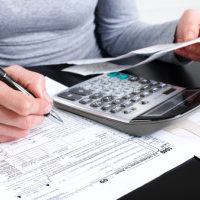Chapter 7 Bankruptcy and Your Taxes

When you file for Chapter 7 bankruptcy it is important to understand that not all debts are dischargeable. Dischargeable debts are those that are forgiven when the court trustee approves your bankruptcy. Normally the debts that are discharged are those that are unsecured, such as those on your credit cards and medical bills. The money you owe on your mortgage and car loan are not dischargeable. The money that you owe the IRS in back taxes is usually not dischargeable, but in certain cases it may be.
Problems Paying Income Tax
It is important to remember that when you file for bankruptcy you are involved in a legal process that is governed by federal and state laws. That means you want to have your taxes in order prior to filing. If you don’t, that can lead to various problems.
Unfortunately, what some people do when things get tight is they decide not to file their taxes with the IRS. They decide not to do so because they owe money, and there is no way that they can pay their tax bill. However, this is the wrong thing to do. If you cannot afford to pay your income taxes, you should still file.
What Will Happen If You Cannot Pay
If you cannot pay, make sure that you file and then contact the IRS after they have processed your return. They will allow you to set up a monthly payment plan. Although there are fees and interest involved, the IRS is very good about allowing liberal minimums. You can always pay more than the minimum, and you may pay off the balance owed at any time. They even make it easy for you to make you monthly payments, which are often as low as 1% of what you owe.
You may pay via the mail, through an automatic withdrawal from your bank account, which is set up through the IRS website, or by using one of various payment services that accept credit and debit cards.
Some Taxes Are Dischargeable
Taxes that are not dischargeable include those for which no return has been filed, those associated with a late return filed within two years of the filing of the bankruptcy petition, or those associated with a fraudulent return.
Taxes are dischargeable under both Chapter 7 and Chapter 13 if they meet the following five criteria. They must meet all five to qualify.
● The due date for filing a tax return is at least three years prior to your bankruptcy.
● The tax return was filed at least two years before your bankruptcy.
● The tax assessment is at least 240 days old.
● The tax return was not fraudulent.
● The taxpayer did not engage in tax evasion.
From the above criteria, you can see why it is important to file your taxes, as this may work in your favor as far as a possible discharge is concerned, and doing so will keep you out of trouble with the government.
Having Financial Problems See Us
Too often those who find themselves in a financial bind will make decisions based on bad advice or simply on a whim. If you are considering bankruptcy, are unable to pay your taxes, and are unsure of or confused about your possible choices, contact The Law Office of Kelley Kaplan & Eller today at 561-264-6850. We will review your financial situation, help you develop a plan, and aid you in addressing your IRS problems and bankruptcy. Get help in this very trying time and make sure that you do get good advice and make smart decisions.



